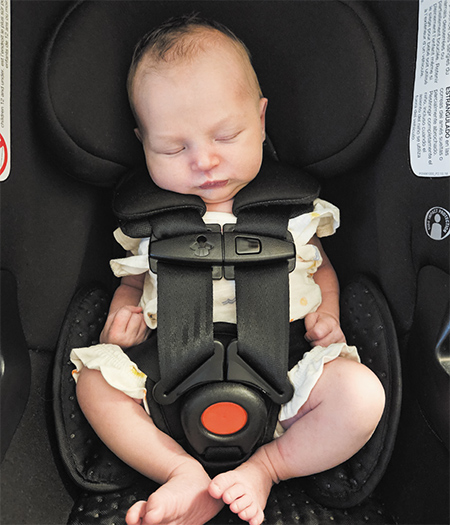Your stay at the hospital or birthing centre
![]() Your stay at the hospital or birthing centre is a unique opportunity to get used to your baby and learn to take care of her. Make the most of it!
Your stay at the hospital or birthing centre is a unique opportunity to get used to your baby and learn to take care of her. Make the most of it!

![]() If you plan on driving home, a car seat is mandatory for your baby from the moment you leave the hospital or birthing centre (see Travelling safe: Car seats).
If you plan on driving home, a car seat is mandatory for your baby from the moment you leave the hospital or birthing centre (see Travelling safe: Car seats).
Hospital stays generally last 24 to 36 hours after vaginal delivery and 36 to 48 hours after a caesarean section. At birthing centres, the stay is usually about 24 hours. The length of your stay may vary depending on you and your baby’s health.
Most hospitals encourage parents to room-in with their newborn. This gives them more time to get to know their baby and get accustomed to taking care of her, with a nurse nearby if they need help or advice.
Rooming in also lets you feed your baby on demand. If you breastfeed, those first moments together are precious for getting your milk production going (see Ways to make breastfeeding easier).
If you have visitors, make sure that they’re not sick when they come to see you and that they don’t have any infections, such as a cold or a cold sore (oral herpes).
Many hospitals and birthing centres provide the opportunity to meet with a vaccination counsellor during your stay there. The counsellor’s role is to support you with your reflection process about vaccination for your child. If you aren’t given this opportunity, don’t hesitate to discuss any vaccination-related questions you may have with your health professional (see Vaccination).
During your stay you must also complete the paperwork required when there is a birth.
Caring for your newborn
During your stay at the hospital or birthing centre, the nurses, doctors, or midwives will provide care to your baby to ensure her well-being and to prevent or screen for health problems.
If you have concerns or questions about the care provided to your newborn, feel free to talk to these health professionals.
Preventive care
In the hours following delivery, the care team will suggest giving your newborn a vitamin K shot to prevent bleeding. Newborn bleeding is rare but can be severe and even fatal.
They will also suggest that an antibiotic ointment be applied to your baby’s eyes to prevent certain serious infections.
Physical examination
During your stay, a health professional will give your newborn a thorough physical examination to make sure she is healthy.
Neonatal screening
The purpose of screening is to detect rare diseases that are generally not apparent at birth but can pose serious risks to a baby’s health. If a child has one of these diseases, treatment must begin as soon as possible, before symptoms appear. Early detection can help prevent or attenuate severe, permanent consequences.
Hearing screening
After your baby is born, you will be offered a hearing screening. A small plug is inserted into your baby’s ear. It’s linked to a device that emits sounds and records the ear’s response. The test is painless for your child.
For more information on screening for hearing loss, visit quebec.ca/screening/ and click on ”Newborn hearing screening“ or call 1-877-644-4545.
Blood screening
Within a few days after birth, the staff will suggest that a blood screening be done. To do so, they will take a few drops of blood from your baby’s heel.
Urine screening
Urine screening is done when your baby is 21 days old. During your stay at the hospital or birthing centre, you will receive a kit to collect a small quantity of urine from your baby, as well as a leaflet with instructions on what to do.
What happens after samples are taken?
For most children, the screening results will be normal and the parents will not be contacted. No news is good news!
If the screening results are abnormal, you will be contacted and referred to a specialized centre for additional tests.
For more information on blood and urine screening, go to quebec.ca/screening and click ”Blood and urine newborn screening“ or call:
For blood screening: 1-855-654-2103
For urine screening: 1-855-905-5253


